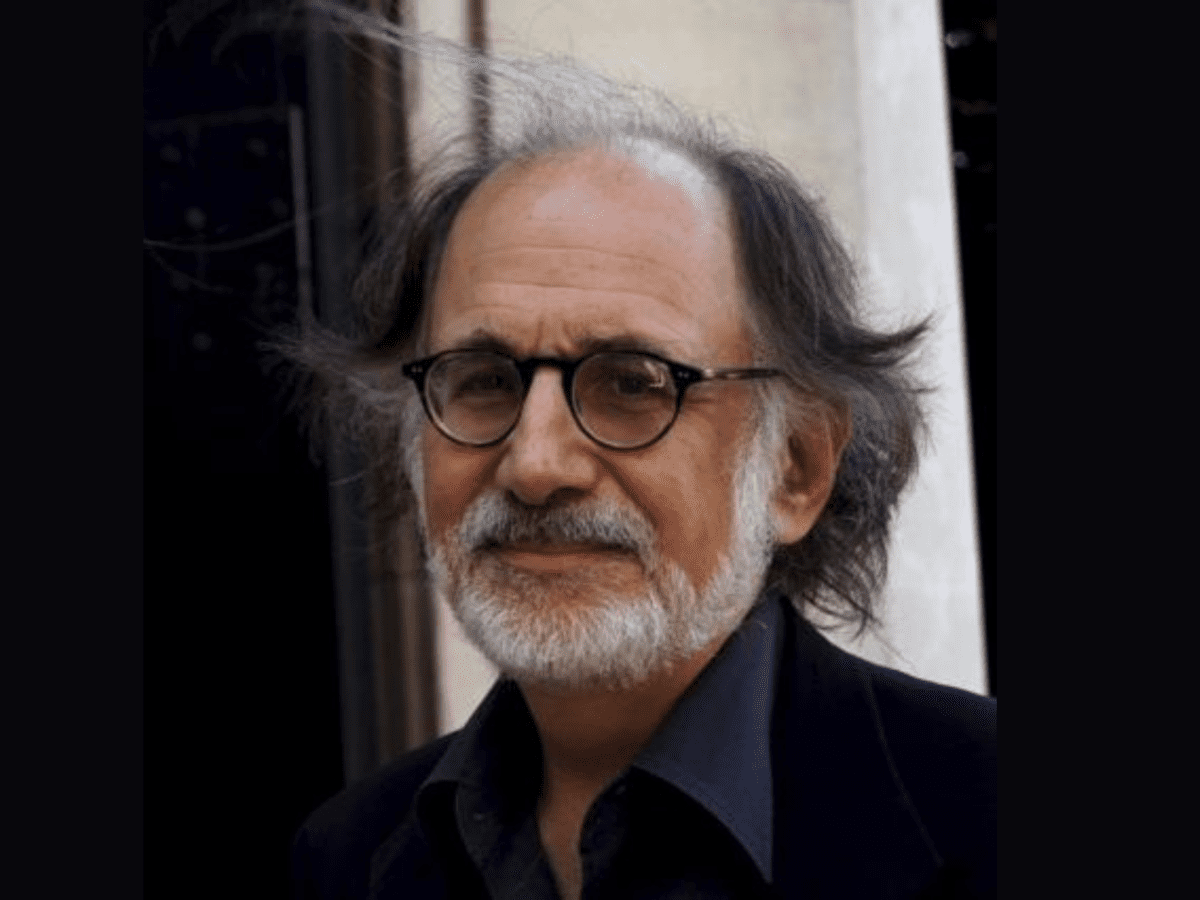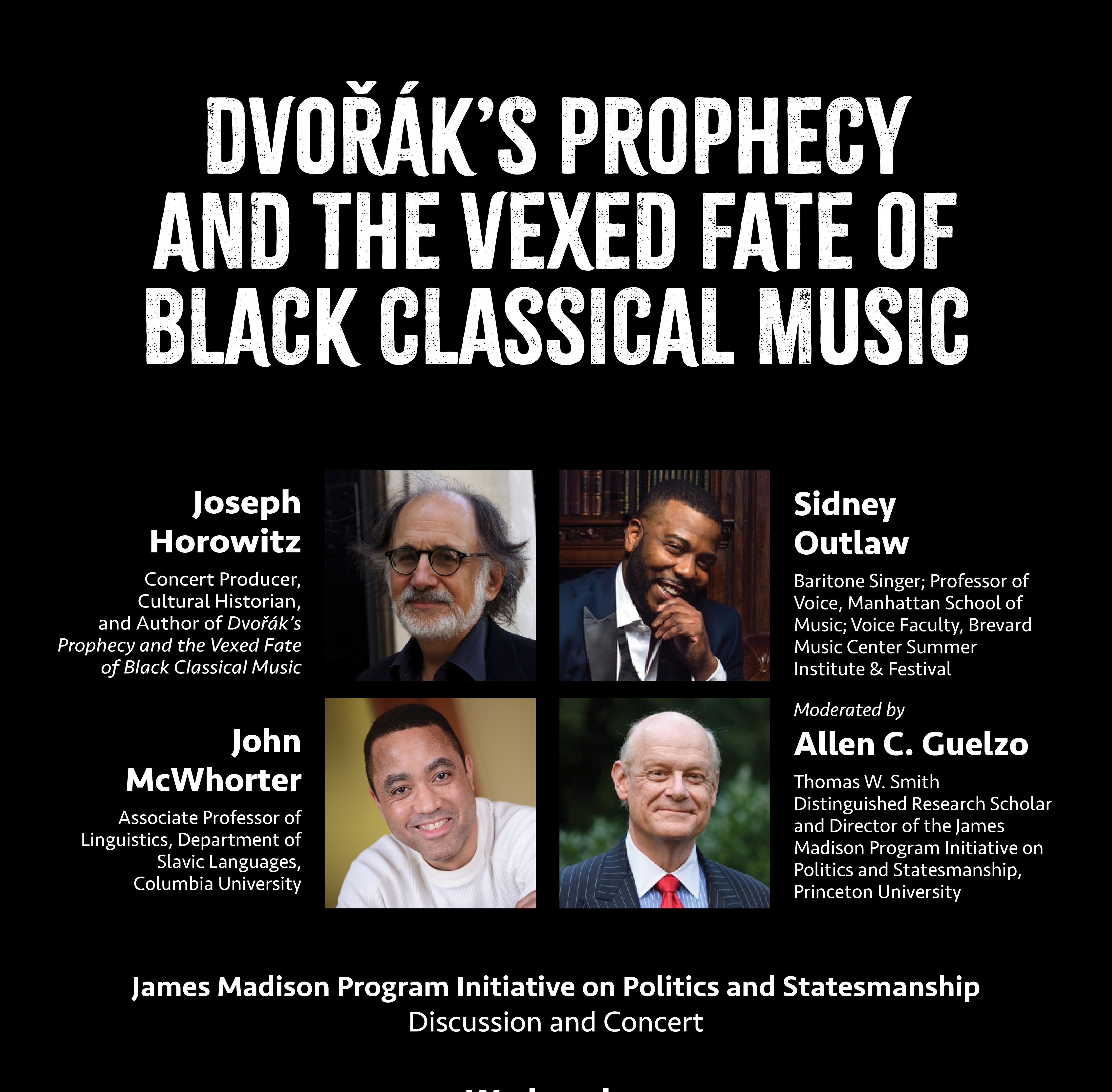Please consult our COVID-19 policies and resources for guidance on attending public performances.

Discussion & Concert – Dvořák’s Prophecy and the Vexed Fate of Black Classical Music
Presented by James Madison Program in American Ideals and Institutions
date & time
Wed, Apr 12, 2023
7:00 pm - 8:30 pm
ticketing
No tickets or registration required – open to all
- This event has passed.


James Madison Program Initiative on Politics and Statesmanship
Joseph Horowitz, concert producer, cultural historian, and author of Dvořák’s Prophecy and the Vexed Fate of Black Classical Music
John McWhorter, Associate Professor of Linguistics, Department of Slavic Languages, Columbia University
Sidney Outlaw, baritone singer; Professor of Voice, Manhattan School of Music; Voice Faculty, Brevard Music Center Summer Institute & Festival
Moderated by Allen C. Guelzo, Thomas W. Smith Distinguished Research Scholar and Director of the James Madison Program Initiative on Politics and Statesmanship
In 1892, the master Czech composer Antonín Dvořák, teaching in New York City, prophesied that the melodies of African-American musical genres would inspire a “great and noble school” of American classical music. But the Black musical motherlode instead fostered popular genres known the world over; American composers mainly squandered the opportunity at hand. A modernist “standard narrative,” popularized by Aaron Copland, kept a distance from the vernacular. Joseph Horowitz, in Dvorak’s Prophecy, proposes a “new paradigm” privileging Charles Ives, George Gershwin, and Black classical music. The recent excavation of Black composers includes Harry Burleigh – with whose “Deep River” Black classical music begins. Our program includes Sidney Outlaw singing Burleigh; John McWhorter reconsidering Gershwin; and Allen Guelzo exploring Ives and the Civil War. The larger endeavor is to embed American classical music in the larger narrative of American culture.
“Horowitz has taught me to listen to Black classical music as what the most American of classical music is. His lesson should resound.”
— John McWhorter, The New York Times
Venue: Nassau Presbyterian Church (in the sanctuary), 61 Nassau St. Princeton, NJ 08542
Joseph Horowitz
Joseph Horowitz is a cultural historian specializing in the American arts. He pursues parallel careers as a scholar/writer and concert producer. The most recent of his eleven books is Dvorak’s Prophecy and the Vexed Fate of Black Classical Music (winner of a 2022 ASCAP-Deems Taylor Award). It links to six “Dvorak’s Prophecy” documentary films he produced for Naxos. His forthcoming books are The Marriage: The Mahlers in New York (April 2022, his first novel) and The Propaganda of Freedom: JFK, Stravinsky, Shostakovich, and the Cultural Cold War (Sept. 2023). Horowitz regularly produces 50-minute “More than Music” radio documentaries for NPR via the newsmagazine “1A,” heard on over 400 stations nationally. He continues to serve as a program curator for orchestras and festivals in all parts of the US. Of his books, Understanding Toscanini was a finalist for the National Book Critics Circle Award, Wagner Nights: An American History was named best book of the year by the Society of American Music, and Classical Music in America: A History and Artists in Exile were both named best books of the year in The Economist. His website is www.josephhorowitz.com(link is external). His blog is www.artsjournal.com/uq
John McWhorter
John McWhorter teaches linguistics at Columbia University, as well as Western Civilization and music history. He specializes in language change and language contact, and is the author of The Missing Spanish Creoles, Language Simplicity and Complexity, and The Creole Debate. He has written extensively on issues related to linguistics, race, and other topics for Time, The New York Times, CNN, the Wall Street Journal, The New Republic and elsewhere, and has been a Contributing Editor at The Atlantic. For the general public he is the author of The Power of Babel, Our Magnificent Bastard Tongue, The Language Hoax, Words on the Move, Talking Back, Talking Black, and other books, including Nine Nasty Words and Woke Racism, both of which were New York Times bestsellers. He hosts the Lexicon Valley language podcast, has authored six audiovisual sets on language for the Great Courses company, and has written a weekly newsletter for the New York Times since August 2021.
Sidney Outlaw
Lauded by The New York Times as a “terrific singer” and The San Francisco Chronicle as “an opera powerhouse”, Grammy-nominated Sidney Outlaw was the Grand Prize winner of the Concurso Internacional de Canto Montserrat Caballe in 2010 and continues to delight audiences in the U.S. and abroad with his rich and versatile baritone and engaging stage presence. His concert and recital appearances include debuts of renowned works at major concert halls: Haydn’s The Creation and Handel’s Messiah at Carnegie Hall, Beethoven’s Symphony No. 9 at Avery Fisher Hall, Mahler’s Lieder eines Fahrenden Gesellen with Music Academy of the West and “Wednesdays At One” at The Julliard School’s Alice Tully Hall.
Joseph Horowitz
Joseph Horowitz is a cultural historian specializing in the American arts. He pursues parallel careers as a scholar/writer and concert producer. The most recent of his eleven books is Dvorak’s Prophecy and the Vexed Fate of Black Classical Music (winner of a 2022 ASCAP-Deems Taylor Award). It links to six “Dvorak’s Prophecy” documentary films he produced for Naxos. His forthcoming books are The Marriage: The Mahlers in New York (April 2022, his first novel) and The Propaganda of Freedom: JFK, Stravinsky, Shostakovich, and the Cultural Cold War (Sept. 2023). Horowitz regularly produces 50-minute “More than Music” radio documentaries for NPR via the newsmagazine “1A,” heard on over 400 stations nationally. He continues to serve as a program curator for orchestras and festivals in all parts of the US. Of his books, Understanding Toscanini was a finalist for the National Book Critics Circle Award, Wagner Nights: An American History was named best book of the year by the Society of American Music, and Classical Music in America: A History and Artists in Exile were both named best books of the year in The Economist. His website is www.josephhorowitz.com(link is external). His blog is www.artsjournal.com/uq
John McWhorter
John McWhorter teaches linguistics at Columbia University, as well as Western Civilization and music history. He specializes in language change and language contact, and is the author of The Missing Spanish Creoles, Language Simplicity and Complexity, and The Creole Debate. He has written extensively on issues related to linguistics, race, and other topics for Time, The New York Times, CNN, the Wall Street Journal, The New Republic and elsewhere, and has been a Contributing Editor at The Atlantic. For the general public he is the author of The Power of Babel, Our Magnificent Bastard Tongue, The Language Hoax, Words on the Move, Talking Back, Talking Black, and other books, including Nine Nasty Words and Woke Racism, both of which were New York Times bestsellers. He hosts the Lexicon Valley language podcast, has authored six audiovisual sets on language for the Great Courses company, and has written a weekly newsletter for the New York Times since August 2021.
Sidney Outlaw
Lauded by The New York Times as a “terrific singer” and The San Francisco Chronicle as “an opera powerhouse”, Grammy-nominated Sidney Outlaw was the Grand Prize winner of the Concurso Internacional de Canto Montserrat Caballe in 2010 and continues to delight audiences in the U.S. and abroad with his rich and versatile baritone and engaging stage presence. His concert and recital appearances include debuts of renowned works at major concert halls: Haydn’s The Creation and Handel’s Messiah at Carnegie Hall, Beethoven’s Symphony No. 9 at Avery Fisher Hall, Mahler’s Lieder eines Fahrenden Gesellen with Music Academy of the West and “Wednesdays At One” at The Julliard School’s Alice Tully Hall.

